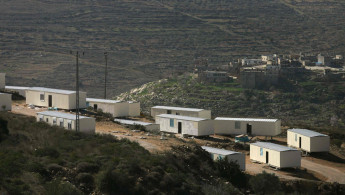Israeli to 'legalise' thousands of wildcat settlement outposts
The Zandberg report, published on Friday, based its recommendations on an October High Court ruling that judged Israeli residents of the West Bank to be among the civilian population of that area, therefore the authorities must protect their welfare, irrespective of Palestinian property rights in the region.
On this basis, the committee made recommendations to authorise some 4,000 settler homes, as well as to continue Israeli building projects in the West Bank such as providing roads and tunnels to connect the isolated settler outposts to other infrastucture and land already expropriated by the Israeli state.
Read more: Israel will not make it to 100
Despite the findings boding ill for any meaningful peace process between Israeli and Palestine, politicians from Israel's pro-settler right were quick to praise the report's findings and call for its swift implementation.
"Strengthening settlements in Judea and Samaria is first and foremost in Israel's security interest," said Israeli Defence Minister Avigdor Lieberman, using the biblical names favoured by pro-settlement Israelis for the north and south West Bank.
"We will act responsibly and creatively and within a few weeks we'll present a comprehensive and systematic plan of action to regularise [legalise] the outposts in Judea and Samaria," he added.
Israel's far-right justice minister Ayelet Shaked also lauded the report, saying: "The end of the era of uprooting settlements without purpose in Judea and Samaria, was led by a team that found legal ways to regulate settlements in Judea and Samaria and to end the shame of evacuating settlements for no real reason," Shaked said.
"The report gives legal tools that are compatible with international law, for the settlement of settlements in Judea and Samaria."
Settlement watchdog Peace Now warned: "This is a serious and dangerous report, which recommends that Israel blatantly violate international law and trample on the protected needs and rights of the Palestinian population," adding the mass authorisation will create a de-facto system of apartheid.
Read more: Palestine: Let's stop pretending it's a fair fight
All Israeli settlements are seen as illegal under international law and major obstacles to peace as they are built on occupied Palestinian territory.
Israel differentiates between settlements it has approved and those it has not.
Those without approval are referred to as outposts and tend to be populated by hard-line religious nationalists who see the entire occupied West Bank as part of Israel.
Past attempts by Israeli authorities to dismantle unauthorised outposts have led to clashes with settlers.
However even settler outposts are often under protection of Israeli forces and given access to water and electricity supplies.





 Follow the Middle East's top stories in English at The New Arab on Google News
Follow the Middle East's top stories in English at The New Arab on Google News
![The UAE is widely suspected of arming the RSF militia [Getty]](/sites/default/files/styles/image_330x185/public/2024-11/GettyImages-472529908.jpg?h=69f2b9d0&itok=Yauw3YTG)
![Netanyahu furiously denounced the ICC [Getty]](/sites/default/files/styles/image_330x185/public/2024-11/GettyImages-2169352575.jpg?h=199d8c1f&itok=-vRiruf5)
![Both Hamas and the Palestinian Authority welcomed the ICC arrest warrants [Getty]](/sites/default/files/styles/image_330x185/public/2024-11/GettyImages-2178351173.jpg?h=199d8c1f&itok=TV858iVg)